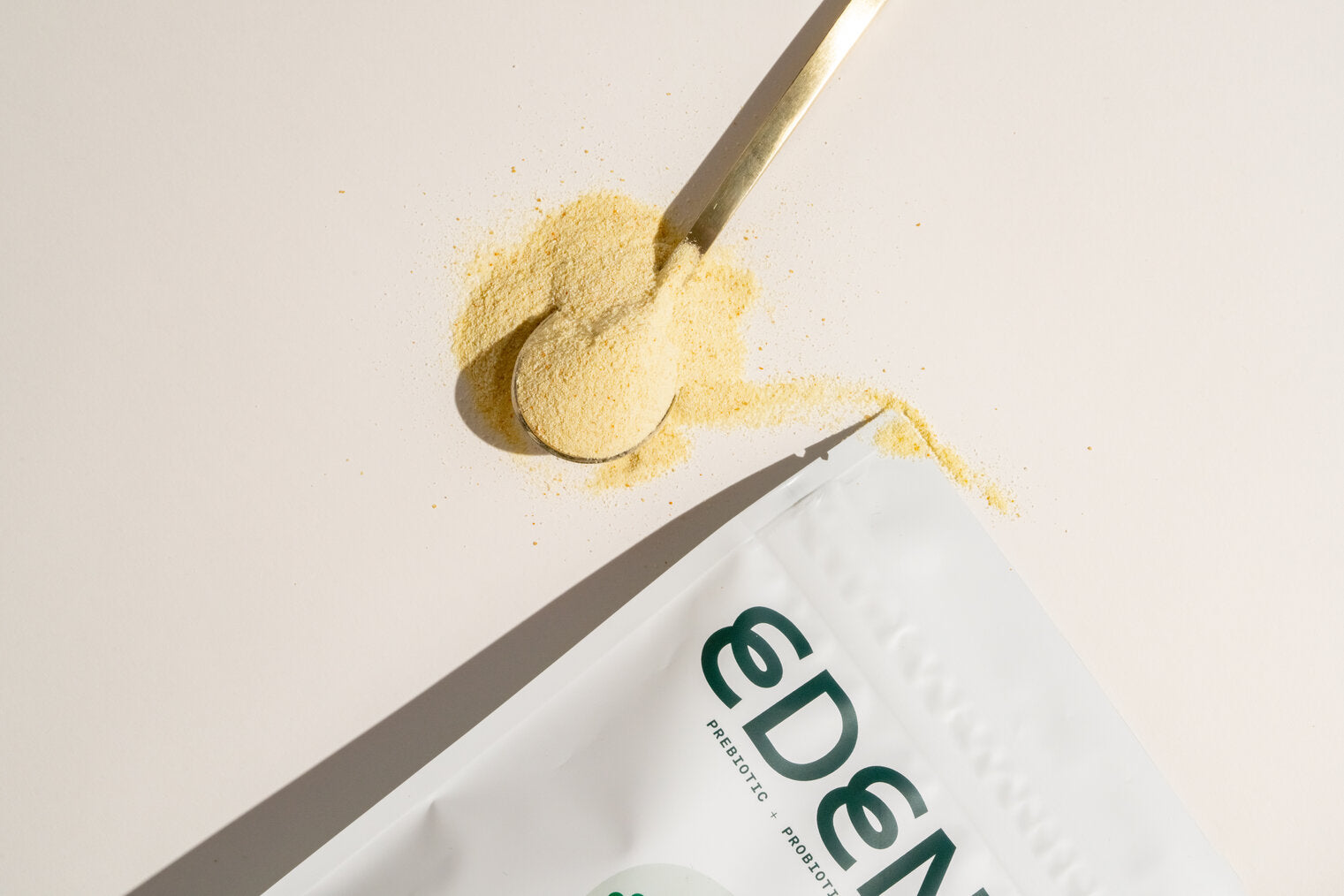Locust bean gum, a prebiotic fiber found in Eden’s synbiotic supplement, holds many health benefits, including improved glucose regulation, cholesterol-lowering effects, and mitigation of certain digestive irregularities. So let's dive into this edition of Eden's ingredient spotlight.
[[mailing_list]]
What is fiber?
First, let's take a deeper look at fiber. Fiber is a type of carbohydrate that is indigestible by humans. Now, you might be wondering, “If I can’t digest fiber, why is it so important?” Even though humans cannot digest fiber, your gut microbiota (collectively referred to as the gut microbiome) — which consists of microorganisms such as probiotic bacteria, viruses, fungi, and yeast — can. The metabolic byproducts of gut microbiota munching away at fiber are important for gut health and can act to reduce the risk of heart disease, stroke, type 2 diabetes, and more.
There are different types of fiber, but they all originate from plant foods such as fruits, vegetables, grains, legumes, nuts and seeds:
-
Insoluble fiber, such as cellulose, comes from foods such as vegetables, beans, nuts, and berries. Insoluble fiber improves bowel health by improving bowel movements and reduces risk of gastrointestinal issues such as diverticulitis and hemorrhoids.
- Soluble fiber, such as locust bean gum, comes from foods such as oats, peas, citrus, carrots, and beans. Many soluble fibers are considered prebiotics: dietary fibers that promote the growth and activity of beneficial bacteria (including SCFA-producing microbes) in the intestinal tract. Soluble fiber also can help reduce the body’s ability to absorb fat, lower cholesterol levels and reduce blood sugar levels.
Turns out that a diet rich in all these types of fiber is considered most beneficial, to reap the rewards of their varying benefits. As the authors of a 2021 study explained, “Microbiome modulation can occur either directly through actions of dietary components on the composition of the microbiome or its metabolic processes, or [our emphasis] indirectly through altering the physiology of the gut to change the intestinal lumen environment, thereby producing changes in the microbiome.” Diverse fiber consumption addresses both of these paths to modulating your microbiome and improving your overall health.
What is locust bean gum?
Locust bean gum comes from the carob tree and is a fiber that has beneficial effects on diabetes, bowel health, heart disease, and colon cancer due to its prebiotic properties. In addition, locust bean gum is chemically stable and products made from locust bean gum are not influenced by salt, acids, bases, and heat treatment. This makes locust bean gum especially appealing to the food industry, where it has been used to enhance richness and spreadability to cream cheese, increase the creaminess of ice cream, and boost thickening properties in baked goods. The Food and Drug Administration (FDA) lists locust bean gum as Generally Recognized as Safe (GRAS) status, meaning that anyone can add it to a nutritional supplement.
The health benefits of locust bean gum
Locust bean gum has many health benefits, including:
- Glucose management. People suffering from diabetes often have trouble regulating glucose, and their glucose levels can spike rapidly following carbohydrate intake — and then decrease just as fast (aka a sugar crash). Carbohydrates ingested with locust bean gum are digested at lower levels, leading to a reduced glucose response and a subsequent mitigated rise in blood sugar levels following a meal.
- Digestion. Many factors contribute to the time it takes for your stomach to empty its contents into the small intestine and for you to feel satiated for longer. For example, consumption of processed foods leads to weight gain (not to mention heart disease, cancer, and other disorders) because they are calorically dense, yet do not make you feel full. When it comes to health, the quality of the calories counts as much as, if not more, than the quantity. Prebiotics, such as locust bean gum, improve digestion by decreasing the rate at which the stomach empties, causing you to feel fuller for longer and helping you to avoid overconsumption of calories. Learn more: How does a healthy gut affect digestive health?
- Reflux. One guarantee of taking care of babies is that you will see a lot of spit up. Needless to say, there has been much research into how to reduce this reflux and regurgitation. Currently, there are several clinical trials being conducted to evaluate the efficacy of locust bean gum for mitigating regurgitation. In one pre-trial study, it turned out that when added to milk, locust bean gum decreased these messy episodes by half!
- Cardiovascular diseases. One of the critical contributing factors to the development of cardiovascular diseases, the leading cause of death worldwide, is an imbalance of good and bad cholesterol. It’s been known for decades that locust bean gum can decrease levels of low-density lipoprotein (LDL) cholesterol (the “bad” cholesterol) and shift the body towards a better lipid profile.
- Cancer. One of the hallmark characteristics of cancer is unregulated cell growth, which can lead to tumor formation. Although the only published studies looking at the effects of locust bean gum on cancer come from cancer cell lines instead of actual cancer patients, evidence suggests that locust bean gum has anti-cancer properties, including its ability to inhibit cancer cell proliferation. Research in this area is ongoing.
- Inflammation. Chronic inflammation of the gastrointestinal system can lead to conditions such as Crohn's disease and ulcerative colitis (together known as IBD). These painful diseases can be treated with medication and/or surgical removal of affected areas, but side effects are common. In a preclinical study, a metabolite of locust bean gum alleviated damage to the colon, increased the amount of probiotics present in the gut, and reduced inflammatory markers, suggesting that dietary supplementation may be an effective alternative treatment for those suffering from inflammatory bowel diseases (IBD). However, well-designed human clinical trials must be conducted before valid efficacy conclusions can be reached.
Gut health support with locust bean gum
As mentioned earlier, prebiotic fibers not only exert beneficial effects on gut functioning independent of probiotics, but fibers such as locust bean gum also enhance the benefits of probiotics by providing a better environment for the latter to thrive, which in turn leads to better gut and overall health.
[[product]]
Much like how you probably prefer certain foods over others, various probiotics prefer munching on particular prebiotic fibers. This is where the power of synbiotics comes in. Synbiotics are supplements that combine the right prebiotics with the right probiotics, in one blend, increasing the supplement’s potential to achieve and maintain a healthy gut by intensifying and elongating the function and efficacy of probiotic bacteria. Eden’s Synbiotic Superblend has been carefully formulated to ensure an optimal pairing of prebiotics and probiotics.
- For example, one of the Eden’s probiotic ingredients, a species of bacteria called Bacillus coagulans, has health benefits that include lowering harmful triglycerides and visceral fat, preventing symptoms associated with irritable bowel syndrome (IBS), producing the antimicrobial substance lactic acid, and helping to digest lactose. B. coagulans can break down locust bean gum to produce beneficial compounds such as β-galactosidase, which helps with lactose digestion.
- In a second example, another Eden’s probiotic ingredient, Lactobacillus rhamnosus, has health benefits involving the digestive and immune systems and it can block bad bacteria, activate the immune system, and restore the microbiome if healthy bacteria are lost due to infection, medication, or disease. Similar to B. coagulans, L. rhamnosus also survives better in the presence of locust bean gum.
In total, the Eden’s formulation contains 14 ingredients: five different prebiotics (including locust bean gum, barley beta glucan, oat bran, guar gum, and resistant potato starch); four probiotics; and five polyphenols — a uniquely-tailored synbiotic blend.
Exploring Locust Bean Gum in Food Applications
Locust bean gum (LBG), a polysaccharide extracted from the seeds of the carob tree (Ceratonia siliqua), is a versatile food additive widely utilized in the food industry. This white powder, also known as carob powder, serves as a thickening agent, emulsifier, and gelling agent in various food applications. LBG, like guar gum, is a galactomannan vegetable gum, often used alongside guar gum to enhance viscosity and texture in food formulations. LBG is primarily used in foods like cream cheese and salad dressing, where it helps improve texture and retain water.
When used in conjunction with guar gum, LBG creates a thicker gel than either gum alone, preventing ice crystal formation in frozen products like ice cream. The extraction process involves splitting and gently milling carob seeds to separate the seed from the brittle germ, which is then dried and milled into LBG powder. Its soluble nature in cold water and its ability to make a thicker gel make it an ideal thickener for a variety of food applications. LBG's origins in the Mediterranean region have also led to its use as a chocolate substitute in some recipes. Overall, LBG plays a significant role in the food industry, enhancing texture and stability in a wide range of products.
Understanding Food Additives: Exploring Thickening Agents
Thickening agents play a crucial role in food production, enhancing texture and consistency in various products. Locust bean gum, derived from the seeds of the carob tree, and guar gum, extracted from the guar plant, are two commonly used natural thickeners. Carob bean gum, another name for locust bean gum, is prized for its thickening properties and is often utilized as a stabilizer in food products. Xanthan gum, a microbial polysaccharide, is another widely employed thickener and stabilizer in the food industry. Carrageenan, derived from seaweed, serves as both a thickener and stabilizer in food products.
Carob gum, derived from the endosperm of carob seeds, is another natural thickener used as a hydrocolloid in food formulations. These additives, including locust bean gum and xanthan gum, are often preferred in gluten-free products for their ability to mimic the texture of gluten-containing ingredients. Ice cream stabilizers and cream stabilizers, which may contain these thickening agents, help maintain the desired texture and prevent ice crystal formation in frozen desserts. Overall, these thickening agents, whether natural or synthetic, play a vital role as additives in the food industry, contributing to the quality and stability of various food products.
Key takeaways
Fibers have numerous health benefits relating both to the ways they can alter the physiology of the gut and modulate the composition of the gut microbiome. Found in foods such as vegetables, beans, nuts, berries, oats, and fruit, you can also obtain prebiotic fibers, such as locust bean gum, in supplements. Supplementing with a synbiotic blend that includes both prebiotics and probiotics offers the advantage of scientifically-selected, studied, tested, and measured (at levels that are more likely to confer health benefits) ingredients, formulated to optimize the benefits of each ingredient separately and combined with the others. Locust bean gum is a prebiotic soluble fiber that provides nourishment for probiotics, supporting the health of your gut microbiome. This prebiotic is associated with positive effects on glucose management, digestion, reflux, cardiovascular disease, and cancer. While prebiotics are generally safe to consume, be sure to work with your healthcare provider before starting supplements, especially if you have any food allergies, intolerances, particular medical conditions, or are taking any medications.

